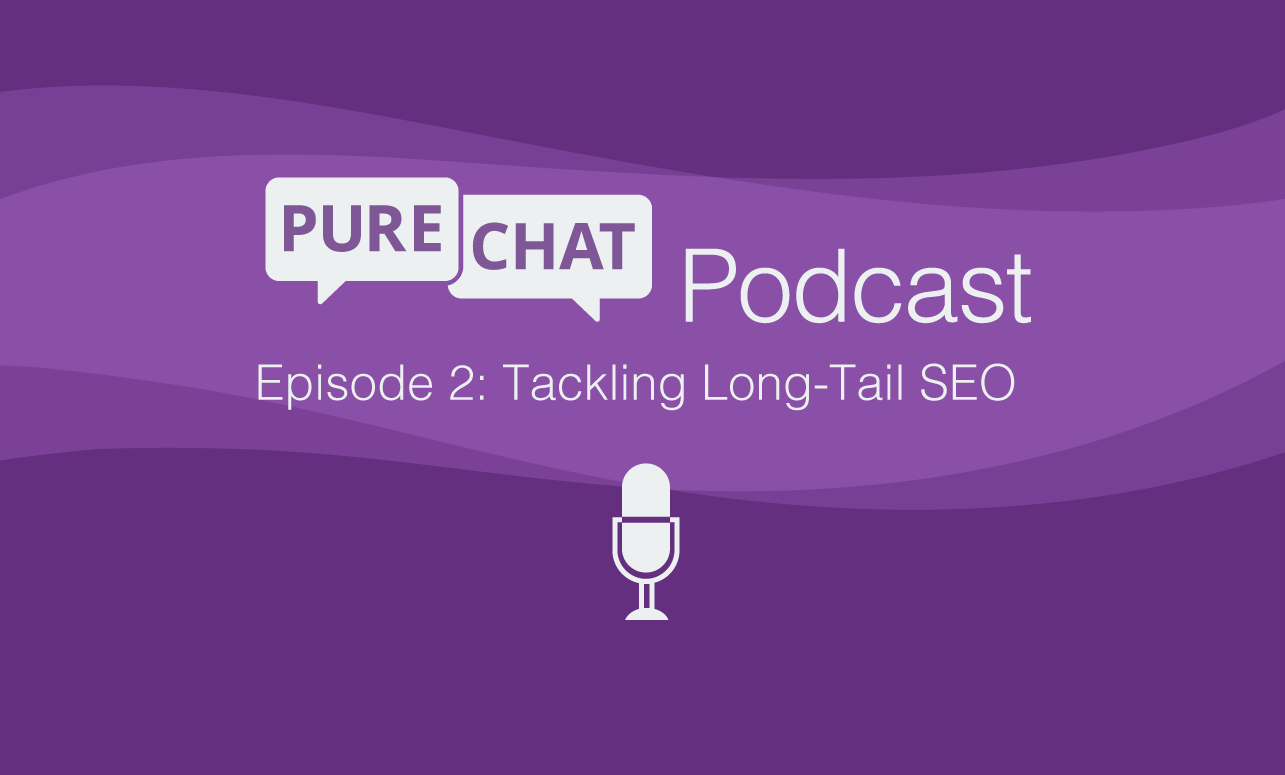Welcome back to the Pure Chat Podcast! This week I talked with eight-year SEO and inbound marketing veteran Ian Garlic about how small businesses can generate more leads with long-tail SEO. Tune in to the podcast or read the interview below to learn what long-tail SEO is and how you can use it to improve your business 🙂
LINKS
- Follow Ian on Twitter
- Check out his podcast the Tao of Inbound
- Learn morn about his web design agency Authentic Web
Full Interview (Watch video here)
Arielle Hurst: I think a lot of people understand what traditional SEO is, which is trying to rank to the top of Google for short key phrase (like for Pure Chat, that would be live chat), but long tail SEO’s a little bit different. Can you tell me about what’s different between the two?
Defining Long-Tail SEO
Ian Garlic: Long tail SEO is called that because if you look at a chart of number of searches, you’ll have this group of searches that happen a little bit more often, 4 or 5, 10, 20 times. Then as the chart goes out, you’ll have a bunch of searches that happen one time, and that’s called long tail SEO.
Why that’s important is because, A, you have a lot more converting terms, and the reason is because people are asking buying questions. B, you get to address people at different points in the conversation.
One example is like “live chat.” Someone might type in live chat, but there’s a lot of other questions that they’ve asked of Google. They asked, “What’s the best chat software, chat that integrates with WordPress? How do I get chat on my website?”
All those types of things are at different points in the buying cycle, and while live chat would be a great one to have, it’ll be a converging term. The more you answer those questions, and the more you’re there, the more authority you have, the more trust you build with someone, and the more they’re seeing you.
If you’re always there answering the question for them, when it comes time to actually buy, the choice is obvious. To purchase, or to retain your services, or whatever you’re looking to have them do, now that they’ve seen you five, six, seven times, they’re most likely going to hire you right away, or at least, give you the first opportunity.
Choosing Long-Tail Keywords
Arielle: Obviously, that sounds fantastic, but trying to think of every phrase someone might search for on Google is tough! How do you hone in on which phrases you should be writing content about?
Ian: Yeah. I go into it with every single client. I’ve done this for hundreds and hundreds of clients. We work with a lot of law firms, and you would think, “Well, at this point, he knows exactly what people are going to type in.”
What people are typing is constantly changing, so what you do, is you build out your content, and then you pay attention to what’s working, and what people are actually asking. You pay attention to those keyword reports, and you start to build upon that. You start to dive deeper into that.
Additionally, you use other resources too, and you pay attention to terms that you hear a lot, questions that you hear a lot on the phone, and on things like live chat. If someone took the time to chat with you, or pick up the phone, and call you, there’s probably 20 or 30 other people that are asking that same question that didn’t take the time to pick up and call you.
You can take that question, and figure out the question that precedes it, or the question that comes after that, and write content about that. Then as you write that, you pay attention to what’s working, and you build upon what’s working. That’s the big thing. I see a lot of people like, “Well, I have to be number one for this term, or number one for these three terms.”
What we used to do is get people to number one for that term, and then they’ll be like, “Well, the phone isn’t ringing.” It’s because it’s not working. You build upon what works, and you build that content upon what works.
Video is Better Than Blog Posts
Arielle: Just now you suggested that businesses should write a lot of content that relates to potential customer questions, but there are other kinds of content that you can create. How does that other content factor into the whole SEO mix?
Ian: Content is anything that you put on the Internet. Of course, it can be written content, but it also can be slide shows, it can be photos, it can be audio content like this. You can take a podcast, you can make a podcast, or you can just make MP3s and put them on there, and have that indexed.
Of course, there’s video, and that’s what we are big into at authenticWEB where we create a lot of video for clients. A lot of videos. Some of our clients, we’ve created 80, 90 videos.
What that does is has them answering that question directly. Video is highly indexed by Google. You probably see those thumbnails in the actual search results besides on YouTube, which is really, really powerful, because when someone sees that video in the search results, they’re going to click on it, and they’re going to watch you.
Plus, YouTube is the second most used search engine out there. It’s ahead of Yahoo, and other search engines. We’re talking about Google of course, but why not be on the second most used search engine too?
Every always questions that, and then I’m like, “Well, how many times have you used YouTube today?” They’re like, “Oh yeah.” “What happened the last time your air conditioner was broken?” “I went and tried to fix it on YouTube.”
Everyone tries to fix everything by watching a video, so it’s very, very powerful content. It’s more powerful than written content.
Optimizing Content for SEO
Arielle: I’m curious though. At one time when people talked about “optimizing their content for SEO”, they planned on loading up an article with a bunch of keywords. Since that’s not the way to do it anymore, how can businesses optimize written content today? And on another level, how should we be optimizing video content so it’s indexed well?
Ian: Sure. I wrote a book called “State Your Claim”, and it’s the basics. You want to be building up the foundation of your Internet presence using these four pieces of Internet capital. Domain, your links, that content, and your online reputation.
When it comes to SEO, and people always ask me what the definition of SEO is, and I’m like, “Well, it’s just being there when people ask questions on the Internet.” Optimize your content means playing around with the key words a little bit, but really thinking as much as possible of those questions. Making sure that you’re building out more of that content, building out more of those links, and making sure that you’re there as much as possible.
The SEO…it’s still about links and volume of content, and just constantly building it up. If you think it’s too much about some of the tricks behind it, that’s when people get into trouble.
Even the best experts are getting in trouble, which is why I people, “If you’re trying to trick the system, and fool Google, well, you’re playing a game against 10,000 of the smartest people in the world where this is their only game.”
You think about it that way, it’s like, “Why not do what they say?” Build up content, answer great questions, be authentic, tell your story, and it will start building over time. Is it going to work tomorrow? No, and if you try to make everything work tomorrow, you’re mostly likely going to break your web presence, and possibly get blacklisted by Google.
Creating Good Content & Claiming Your Domain
Arielle: Not everyone feels like a good writer, or has any experience doing filmmaking. Do you have any tips to help people feel more comfortable creating content, or ways that they can execute this without having to do something elaborate?
Ian: A, play around with different techniques. You don’t have to write 500, or 1,000 words. It can be little bits of content, and pay attention to what works for people. Start doing it. Once client I saw today started making videos himself years ago. It’s fun to watch the progression of the quality of video, and they got better, and better, and better. It’s really about starting doing it, and paying attention.
You’re not going to be great at it at first, but it’s a fact of life that you need to do it. You can always hire people to do it, but still having a good base understanding of how it works is going to help you communicate with them.
Just start doing it, and start getting it out there. Plus, do it on your own website as much as possible. I talk about your piece of Internet capital. Your domain is your Internet capital.
I see a lot of people building content on other websites. They put a whole paragraph, or two, or three paragraphs on Facebook, or commenting on Facebook, or commenting here and there.
While that’s good, a little bit for links, and for your social value, really be putting that content on your website, and just do it on a consistent basis. I tell people,”15 minutes a day, if you just put that timer down. 15 minutes. Don’t do more than that. Just sit there for 15 minutes. Over a course of a year, you’ll have plenty of content.”
Arielle: That’s a great way to get started. It really shook things up when Facebook started charging businesses to reach their fans, because so many companies that built their audience over Facebook realized, “Wow, I don’t own this real estate.”
Although that’s disappointing for a lot of businesses, you’re right – they’ve got to build a web presence with their own domain.
Ian: It’s so true. If you think about it as your piece of real estate, your domain, if you go onto Facebook, you’re renting. You go on Twitter, you’re renting. Well, at Twitter, at least, you’re not going to do a ton of content, but still, you’re renting. At any time, somebody can be like, “You know what? You’re out of here.”
Why spend that time renovating all of Facebook, when you can renovate your house? It’s like renting an apartment. Spending $100,000 to renovate it when you could have owned a house.
Get Used to “Not Knowing”
Arielle: Speaking of content, you actually have your own podcast called “The Tao of Inbound.” I started listening to it last week, and it’s fantastic.
Ian: Thank you.
Arielle: In your first episode, you talk about entrepreneurs, and how they have to accept this whole thing about not knowing. I feel like for strategies that take a long time. Not knowing is big factor of that, so can you talk about that a little bit for us?
Ian: Sure. It’s one of those things as an entrepreneur, and as people in general. We watch TV shows, and we know the end of it, and we watch movies, and we know what’s going to happen.
It’s scary because if you were an entrepreneur, and you were in a work place, you’re like, “Well, I knew I was going to get a check, et cetera. I knew this was going to work,” but really, the things that work the best are the ones we don’t know about. If you accept that you’re not knowing, and just do things, you’re going to end up in a great place.
You know generally where you want to go, and just start working at it, and accepting it. You’re also going to be able to pay attention if you accept that you don’t know what the key words.
I accept when I go into a process, a job that we don’t know exactly what’s going to work, but we start working, and pay attention. If I’m focused thinking, “Oh, I know what’s going to work,” and I’m looking for that, I’m going to miss that really big opportunity.
When you bring up Facebook. Facebook started one way, and they paid attention, and went the other way. Twitter, all of them, the way they really started is not the way that they succeeded. They went into it not knowing and accepted what was working, and what people were paying attention to, and that’s when they succeeded.
You never know, also, when it’s going to happen, so you just got to keep going.
The Key to Great SEO
Arielle: I like where you said, “Where they started isn’t where they succeeded.” That is a really hard thing to remember, but I think is so true as we go through the waves as entrepreneurs trying to figure everything out.
To tie things up, I want to just ask you one more question. If you were to give one bit of encouragement to the small businesses who are our customers, what would you say to them, and what should they be focusing on?
Ian: As long as your heart is in it, and you’re really helping people, you’ll have the encouragement. You pay attention to that, and that’s going to keep you going, because if it’s just about money, unless you’re really money motivated, you’re not going to have the motivation to keep going, to really help people.
The best way to do that, and the best way to do really well in SEO, and the best way to really do well at social media, and the best way to do anything, is to listen. Listen to what people want, listen to what they’re saying to you. Really listen, and a little deeper than that question. What is that question really about?
If you pay attention to that, and help, and answer that question, you’ll succeed time and time again, I promise you. It always happens. It’s listening to what people really need. Like I said, we work with a lot of attorneys. People don’t want a criminal defense attorney. The want to not go to jail. [laughs]
Arielle: Fair point. [laughs]
Ian: They want their freedom. They want to not be embarrassed. There’s other things behind it, and if you can answer those questions, you’re going to succeed.







This was truly an awesome podcast with great questions and answers. SEO can truly be a huge burden for small businesses (only in the sense that it adds a great deal of complexity for traditional businesses and owners) but it is truly imperative in today’s marketing. Lots of good information in this article. Kudos.
Thanks Govind – I really appreciate that!